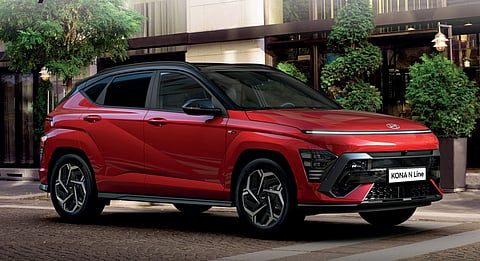

A month after being beaten to the second spot by Tata Motors, Hyundai Motor India has put up a stronger number for March, even as Tata Motors' numbers are awaited.
In March, the company's domestic dispatch of vehicles to dealers rose by 5% to 53,001 units in March, from 50,600 units in the same period last year.
This comes after a surprising dip in February, when it sold just 50,201 cars and SUVs, allowing No.3 Tata Motors to overtake it. In January, the company had sold 57,115 units.
The recent launch of the Creta Facelift in India generated significant demand for the SUV in the first month, but the hype seems to have subsided, resulting in lower sales in February.
Unlike Tata Motors, Hyundai also gets decent volumes from exports. In March, exports saw significant growth of 16% to 12,600 units, compared to 10,900 units in the year-ago period.
For the full year, Hyundai Motor India achieved its best-ever sales of 7.78 lakh, marking an 8% increase over the 7.21 units sold in the 2022-23 financial year.
In the domestic market, the auto major dispatched 6.15 lakh units to its dealers, an 8% increase from the 5,67,546 units in FY 2022-23.
Exports grew by 7% to 1.63 lakh cars and SUVs.
"In the domestic market, company sales surged by 8.3% in 2023-24, against the previous year. These are the highest sales reported by the automaker since inception," the company said.
Hyundai Motor India Limited (HMIL) entered the Indian automotive market in 1996 and has since become a major player in the industry. The company's journey began with the launch of the Hyundai Santro in 1998, which was well-received by Indian consumers due to its affordability and features.
Over the years, Hyundai has introduced a wide range of vehicles, including the i10, i20, Verna, Creta, and Tucson, catering to various segments and customer preferences.
Hyundai's market share in the Indian passenger vehicle (PV) market remained relatively stable, fluctuating between 14% and 17%, behind Maruti Suzuki, the country's largest car manufacturer.
During the period from 2018 to 2023, Hyundai faced intense competition from both domestic and international automakers.
In 2018, Hyundai launched the updated Creta, which continued to be a strong seller in the compact SUV segment. The following year, the company introduced the Venue, a subcompact SUV that gained popularity among younger buyers.
Since the pandemic, Hyundai launched the Alcazar, a three-row SUV, and updated versions of the i20, Creta, and Tucson. It is, however, under competition from rivals, particularly in the SUV segment, which has been growing in popularity among Indian consumers.
Tata Motors' passenger vehicle sales were less-than-hearty until about seven years ago. Its true turnaround came with the launch of the Tiago hatchback in 2016, with the car receiving positive reviews for its design, features, and value for money.
The Tiago's success was followed by the introduction of the Tigor compact sedan and the Nexon compact SUV, which also gained popularity in their respective segments.
After the pandemic dip, Tata Motors has been able to report monthly auto sales in the range of 45,000-52,000, allowing it to challenge Hyundai.